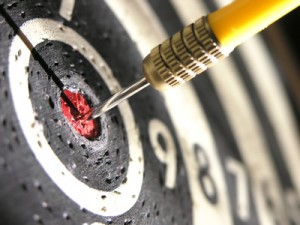
Being right is addictive.
That small pleasure you get when you prove someone wrong is like heroin.
But like heroin, it’s temporary. Soon enough the high wears off and you need another hit.
You need to prove yourself right again.
Oh, you’ve convinced yourself that you are a good person and you are not proving the other person wrong. You are just proving yourself right.
Tell that to the person you just proved wrong!
And like heroin, the addiction of being right erodes. (And in a moment I’ll tell you how it prevents you from achieving your goals.)
Soon your true self-worth is supplanted by the subconscious fear that if you aren’t right, then you aren’t worthwhile.
You’ve all met the extroverted know-it-all who gets in your face when she’s right. She loves it and lets everyone know it. Maybe she knows how annoying she is, or maybe not. But in her wake she leaves fragile relationships and tentative partners who avoid her when possible.
Now before you assume that everyone who is addicted to being right is a loud-mouth, there’s another type.
The “introverted, be-righter”.
It’s hard to spot them (not that I’m saying you need to seek them out). And maybe, just maybe, you are one of them.
How would you know if you are an introverted be-righter?
– Do you not admit to being wrong?
– When hearing someone make their point on some trivial issue do you stop listening and start thinking of rebuttals (even if you never speak them)?
– Do you even spend time later trying to gather evidence?
– Are you a “yes…but…” guy, who pretends to agree with someone, and then bashed the other guy over the head with your wisdom? “Yes, that’s a great idea, but it will never work because you forgot that the dorsal fin only has a thermic generation of 1.98.”
It’s hardest when you see it in one of your kids. You see their craving for filling some unseen hole that apparently can only be filled by being right. It might start with correcting a younger sibling. Then as a teenager kids tend to think their parents are always wrong, right? Most people outgrow all this. Did you?
I know this addiction well. I love being right.
Proving others wrong has been a massive motivator for me.
I’m not saying it’s all bad. One of my businesses was in part fueled by my desire to prove other people (those who said I couldn’t do it) wrong. Actually, it’s often fear that motivated us. What if they were right? I can’t let that be the case so I have to prove them wrong!
But here’s the insidious danger in being right all the time.
So What’s This Got To Do With Goals?
Being right all the time can turn into blaming of others for your situation.
After all, if you are always right, and yet your choices or decisions or inaction or mistake leads to pain, then of course it can’t be because you were wrong. It must be because someone else didn’t fulfill their role. Or they lied to you. Or they cheated.
Sometimes the blame is victimless. The “universe conspired” against you. For example, my daughter couldn’t find one of her lipsticks. She “knew” that she left it on the counter. So it started with blame to her sister. “You must have taken it because I know I left it here.”
When the errant lipstick was discovered in the wash, in her jeans pocket, she still couldn’t admit to being “wrong”. “Well, I know I left it on the counter so I don’t know how it got in the wash.”
Really?
Like all addictions, the psychological defenses we prop up to feed our habit are mind-numbingly illogical.
It’s relatively harmless when we’re talking about a missing lipstick.
But what about when it’s failure on a test (when the real failure was setting the right goal – to get a good grade – and identifying the steps to get there)?
Or when you not only fail to lose your 20 pounds of fat but actually gain 5 more? Victimhood is akin to being right – you don’t want to be wrong so you blame your genetics or your wife or something else.
When actually, your goals were off. Your workplan was off.
Setting great goals starts with accepting full responsibility for their achievement.
And you will fail sometimes. You might be wrong and set the wrong goal. If you can’t admit to being wrong, you won’t learn from the experience and tweak the goal and action plan so that you can actually excel.
And when setting goals, there are so many unknowns. You might not have planned for slipping, falling, and having a leg cast for 8 weeks. That would mess up a lot of goals. But if you are addicted to being right – and therefore looking to find fault elsewhere – you’ll be blocked from finding a creating way to STILL achieve your goals even though you have a cast on.
How Do I Change?
Most of us who are addicted to being right have had years of reinforcing habits. Extracting ourselves from the mesh is no easy task.
It starts with small things.
If you can learn to simply let the small things go, you are on the road to recovery.
Don’t argue with the waiter over whether or not you said you wanted the dressing to the side. It doesn’t matter who is right.
True self confidence comes not from proving to other people who is right and who is wrong but proving to yourself. And admitting to yourself when it is you who is wrong.
If you can start with the small things, you can eventually work up to admitting that you gained 5 pounds of fat because you set poor goals or because you failed to follow through.
And without trying to prove yourself right (and other people wrong), you’ll find creative ways to achieve all your goals.
Am I right?
